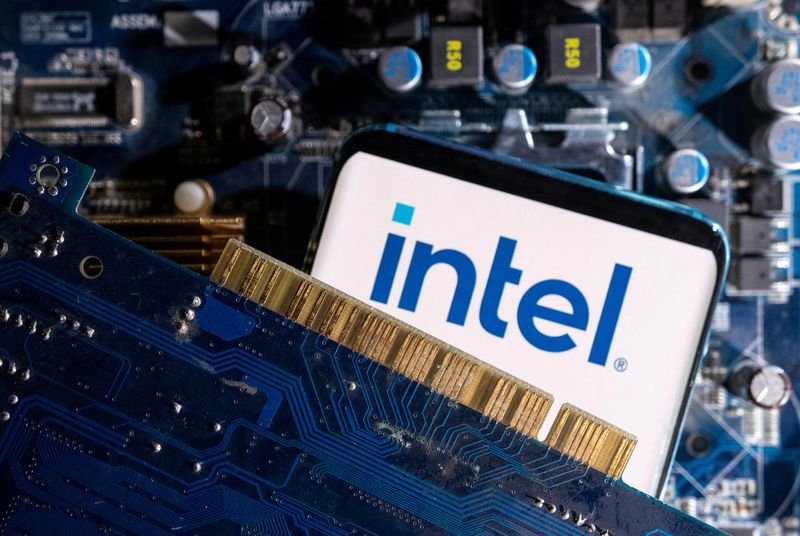Intel's quarterly revenue tops expectations as investors await new CEO
Published by Global Banking & Finance Review®
Posted on January 30, 2025
4 min readLast updated: January 26, 2026

Published by Global Banking & Finance Review®
Posted on January 30, 2025
4 min readLast updated: January 26, 2026

Intel's revenue beat expectations despite CEO transition challenges, with investors seeking clarity on future strategy.
By Max A. Cherney and Arsheeya Bajwa
(Reuters) -Intel on Thursday posted December-quarter results that beat analysts' low expectations, while its forecast for current-quarter revenue missed estimates as the chipmaker grapples with tepid demand for its data center chips and as investors wait for a new CEO.
Shares of the Santa Clara, California-based company climbed 3.8% in after-hours trading. Last year, Intel's shares lost about 60%.
The company's quarterly results and forecast were overshadowed by questions about its long-term strategy and efforts to replace former CEO Pat Gelsinger, who was ousted last month. Two interim co-CEOs currently run the former No. 1 U.S. chipmaker which is struggling to catch up to its rivals, especially AI chip maker Nvidia.
As Intel undergoes a historic transition and attempts to emerge from one of its bleakest periods, it has also struggled to cash in on a boom in investment in advanced AI chips.
On a conference call with investors, Co-interim CEO Michelle Johnston Holthaus said Intel was shelving its forthcoming graphics processing unit (GPU) design called Falcon Shores, leaving it with no major new products for AI customers. The company said it planned to use Falcon Shores as an internal test chip and focus on future data center AI products.
In its quarterly report after the closing bell, Intel said it expects first-quarter revenue of $11.7 billion to $12.7 billion, compared with analysts' average estimate of $12.87 billion according to data compiled by LSEG.
Companies looking to capitalize on generative AI technology have prioritized spending on specialized AI processors that can churn huge amounts of data, crimping demand for the traditional server processors that Intel sells.
The company's outlook for slower demand was due to "normal seasonality" and potential tariffs from President Donald Trump's administration, interim co-CEO and Chief Financial Officer David Zinsner said in an interview.
Zinsner said the threat of tariffs may have pushed customers to buy more of Intel's chips ahead of the first quarter to avoid higher costs should officials implement the tariffs.
Zinsner said the company's goal was to ensure operating expenses were at roughly $17.5 billion for 2025.
Intel last year scrapped a 2024 forecast that it would sell over $500 million worth of its new AI processors, named Gaudi, suggesting they struggled to compete against Nvidia's chips.
On an adjusted, per-share basis, Intel forecast it would break even for the current quarter. Analysts expect adjusted profit of 9 cents per share.
It is spending heavily to become a contract manufacturer of chips for other companies, leading some investors to worry about pressure on its cash flows.
Holthaus said in an interview the "board search was progressing" in its search for a new CEO and until the pick is announced "we're focused and we know exactly what needs to be done."
Investors are looking for clarity around the future of the business that a new chief executive would bring.
"The absence of a new CEO announcement may contribute to investor uncertainty, as leadership stability is crucial for navigating this competitive landscape and executing turnaround plans," Running Point Capital Chief Investment Officer Michael Schulman said.
Intel reported fourth-quarter revenue fell 7% from a year earlier to $14.26 billion, beating estimates of $13.81 billion.
Grants Intel received related to federal CHIPS Act money were responsible for part of the company's revenue and profit margins that beat expectations in the fourth quarter, Zinsner said.
The PC market - Intel's largest by revenue share - saw global shipments rise only modestly last year, underperforming analysts' expectations of a strong rebound after months of declines.
The company has also been losing share in the PC and server CPU market to rival AMD, a trend analysts expect to continue into 2025.
(Reporting by Arsheeya Bajwa in Bengaluru and Max A. Cherney in San Francisco; Editing by David Gregorio)
Intel reported fourth-quarter revenue of $14.26 billion, which was a 7% decline from the previous year but exceeded estimates of $13.81 billion.
Intel is struggling to compete with Nvidia's chips and has decided to shelve its upcoming GPU design, Falcon Shores, which has raised concerns about its market position.
Investors are uncertain about Intel's future due to the absence of a new CEO, which is crucial for providing clarity and stability in the company's strategy.
Intel expects first-quarter revenue to be between $11.7 billion and $12.7 billion, which is below analysts' average estimate of $12.87 billion.
Part of Intel's revenue and profit margins that beat expectations was attributed to grants received related to the federal CHIPS Act.
Explore more articles in the Finance category
